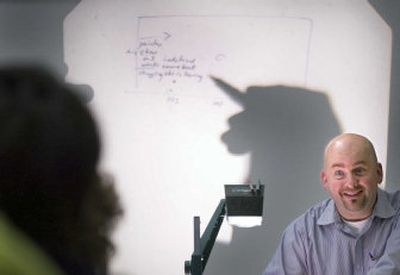Film class gets two thumbs up

Eric Woodard watched some of his smart students flounder in English classes as they begrudgingly wrote essays on classics like the Old English poem “Beowulf.”
The Lewis and Clark High School English teacher wanted to capture untapped minds, so after a year’s work he got the district’s approval last year to toss out the traditional textbook for his class, “Writing About Film.”
“I thought I could use film as a text and take some of the pressure off these kids to read, to allow them to show how they can write,” Woodard said. “I’m getting the best writing I’ve ever gotten in my career. … They have something to say to me, and they know I read it.”
Now in its second year, Woodard has established the class as a writing-intensive challenge with heavy analysis required. He wanted to be clear that this wasn’t the place to come and simply watch movies all day.
Emily van der Walde, 17, a senior who works on the yearbook, said she likes to sit and soak up the lively discussions in class.
“It’s a topic I can really get into,” van der Walde said. She dreads many of her traditional English assignments, but with movies, time slips away effortlessly.
“It’s the same thing with the writing. You get really enveloped with it,” van der Walde said. “We did a ‘Beowulf’ essay. I didn’t get as excited about that.”
Woodard worked with Ferris High School teacher Erik Powell in developing the course and going through the year-long process of getting district approval. Both started the movie class last year.
Woodard teaches students what he calls the grammar of movies, the background and understanding of various camera angles and shooting techniques to become visually literate.
Powell delves more into the history and actual hands-on making of a film. At the end of the semester, his students create their own short films.
The best thing about the course is that it puts together the highest-performing students with less successful students – and they have rousing debates, Powell said.
“The problem of motivation goes away because most people from all across society watch way more films than they read,” Powell said. “They don’t read much. That’s just the reality of it.”
Both teachers use film to teach critical thinking skills.
“My goal is to bring in those students from all different backgrounds, and give them tools to think critically about film,” Powell said. “Film has been taught in universities for years to great success. I can’t believe it’s taken this long for high schools to teach it. It makes sense. We live in a visual culture. We are around film.”
Powell hopes to expand his class to accommodate the growing list of juniors and seniors waiting to take his course.
Now that the course is developed, teachers at all the district high schools have the option of offering the class, said Sharon Becker, district director of professional learning. She helped both teachers design the class.
“They did the leg work and everyone benefits,” Becker said.
Neither teacher is allowed to show R-rated films, which doesn’t mean students don’t bring up the films they’ve seen at home.
In a typical daily discussion on movie plotlines, students talked about themes in films like “A Clockwork Orange,” “Pulp Fiction,” and “Fight Club,” three violent films ripe with meaning.
Woodard, who’s a fan of the artistic value of “The Godfather,” said he’s very open about telling his students about the violence and sexual nature of films that come up in discussion.
“I’m always telling them if they don’t like this type of film, they shouldn’t watch it,” Woodard said.
Woodard’s student, Jake Scherer, always held “Pulp Fiction” as his favorite film. Since taking the class his tastes have opened up to include “Citizen Kane,” the story of an infamous newspaper publisher who dies alone uttering the word “Rosebud.”
“Now I like a lot more movies since I’ve been through this class,” Scherer said. “So far I’ve learned more in this class than in any other English class.”
Woodard still embraces the classics, which he teaches in other classes like junior Advanced Placement English. He just can no longer ignore the impact of images on society.
“People are influenced by images as much as they are texts when it comes to political campaigns,” Woodard said. Those visual skills can be honed by analyzing movies, he said.
Film is the dominant art of the 20th century, Woodard said. “We all watch films. A lot of people don’t read novels anymore.”